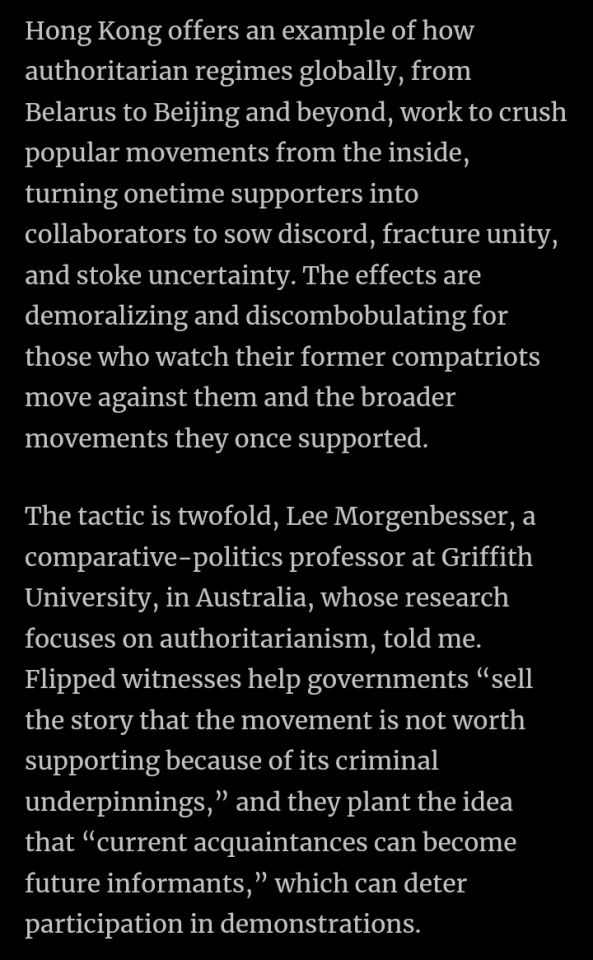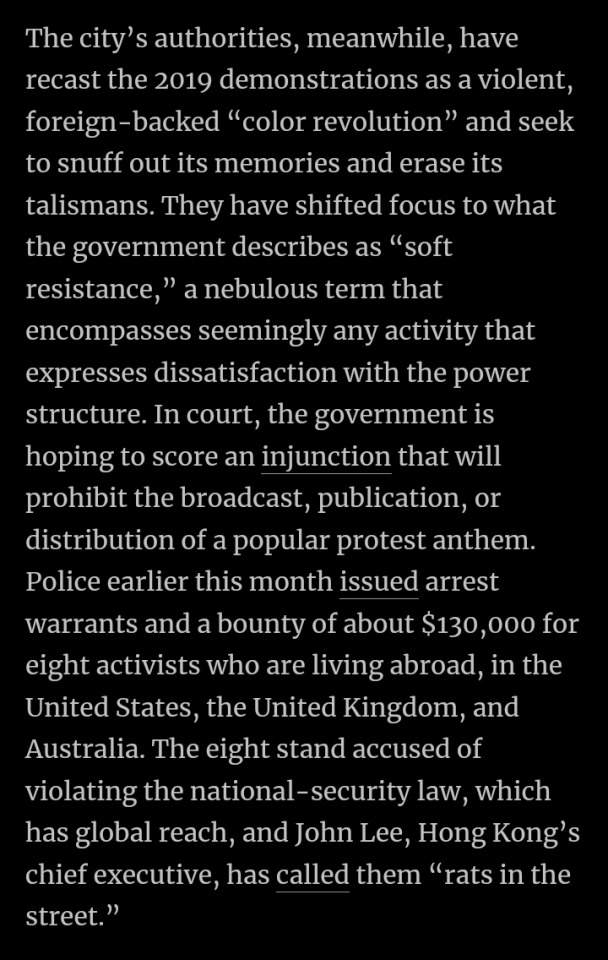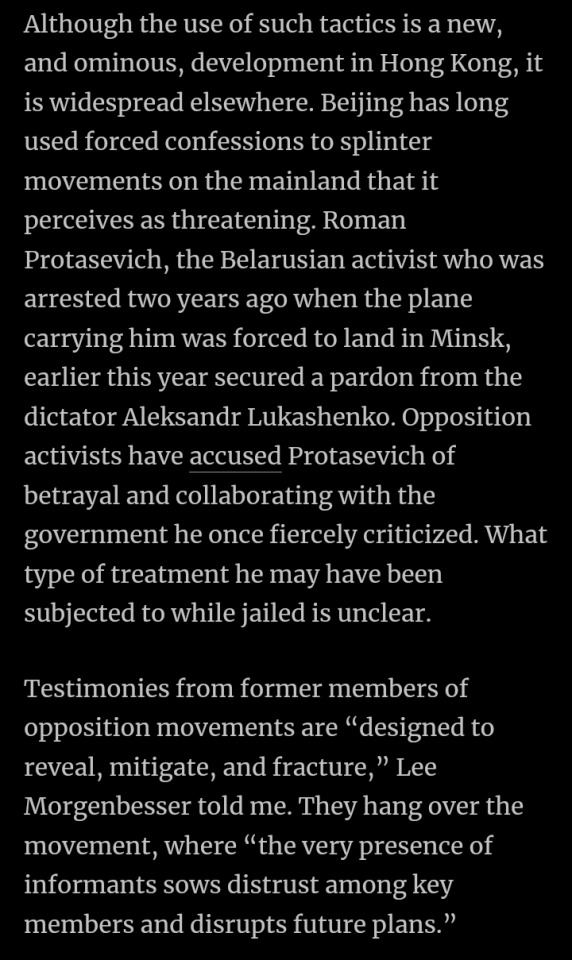#hong kong pro-democracy protests
Text
A Hong Kong man has been sentenced to 14 months in jail after pleading guilty to sedition for wearing a T-shirt with a protest slogan on it.
The jail term is the first handed down by the city's court under a new local national security law that was passed in March.
The law, also called Article 23, expands on the national security law that was imposed by Beijing in 2020.
Critics feared the law could further erode civil liberties in the city, while Beijing and Hong Kong defended it, saying it was necessary for stability.
Chu Kai-pong, 27, was arrested at a subway station in June wearing a T-shirt sporting the phrase "Liberate Hong Kong, revolution of our times". He was also wearing a mask that read "FDNOL" - initials for another slogan, "Five demands, not one less".
Both slogans were frequently heard in large-scale protests in Hong Kong during the months-long anti-government demonstrations in 2019. Local media reported he was also carrying a box containing his excrement to use against people opposing his views.
Chu was arrested on 12 June, the anniversary of a key date of the 2019 protests when particularly large crowds took to the city's streets.
The court heard Chu told police he wore the T-shirt to remind people of the protests, according to Reuters. He was previously jailed for three months in a separate incident for wearing a T-shirt with the same slogan, as well as possession of other offensive items.
Chu has been remanded in custody since 14 June. On Monday, he pleaded guilty to one count of doing an act with a seditious intention".
In his judgement read out on Thursday, chief magistrate Victor So, who was handpicked by the government to hear national security cases, said Chu intended to "reignite the ideas behind" the 2019 protests.
He said Chu "showed no remorse" after his previous conviction, and that the sentence reflected the "seriousness" of the sedition charge.
The conviction and sentencing have been criticised by human rights groups. Amnesty International's China director Sarah Brooks described it as "a blatant attack on the right to freedom of expression", and called for the repealing of Article 23 in a statement.
The sentencing comes after a landmark ruling of another case last month, when two journalists who led the pro-democracy newspaper Stand News were found guilty of sedition. That marked the first sedition case against the city's journalists since Hong Kong's handover from Britain to China in 1997.
12 notes
·
View notes
Text
Lai Ching-te will be Taiwan’s next president after winning Saturday’s election, ensuring that the ruling Democratic Progressive Party (DPP) will remain in power and dealing a rebuke to Beijing’s wishes for a more China-friendly administration. In the days before the election, Taiwanese voters were flooded with information. Look up, and they saw posters on buses and buildings declaring the virtues of all three candidates and their running mates. Look down, and they got a stream of news, gossip, and opinions from their phones—not all of it true and much of it likely stirred up by internet trolls in China.
Taiwan is one of the world’s most digitally connected countries, and on social media, false posts and videos are reaching thousands of people before platforms can take them down. TikTok was flooded with disinformation accusing Lai of sex scandals, tax evasion, and conspiring to start a war with China. His vice presidential pick, Hsiao Bi-khim, has been accused of secretly holding U.S. citizenship. So has the running mate of Ko Wen-je, the third-party candidate livestreaming his spoiler campaign on YouTube and TikTok.
Researchers have attributed much of the false information to Chinese actors—and rather than blasting pro-China views to Taiwanese voters, they’ve focused on amplifying negative stories about Taiwan’s domestic politics and wedge issues, such as the role of the United States, with the intent of polarizing Taiwanese society.
“Beijing’s cognitive warfare is evolving,” said Tzu-wei Hung, a scholar at Taiwan’s Academia Sinica. “Negative narratives are effective not because they will change the election result but because they intensify social conflicts and create a vicious cycle of distrust and hate.”
Taiwan faced a similarly toxic disinformation environment before the 2020 presidential election, and at the time, it fought back—hard. Officials frequently accused China of being behind wide-ranging disinformation campaigns. Police summoned private citizens for posting false stories and levied fines in some instances for violating a law preventing public disorder. The National Communications Commission (NCC) issued a series of fines to the pro-China TV station Chung Tien Television (CTi) for broadcasting false information. Eventually, in December 2020, CTi was taken off the air after the NCC declined to renew its broadcast license.
The government learned quickly that none of it worked.
“If you want to curb disinformation by legal measures, it’s difficult and dangerous,” said Yachi Chiang, a professor at National Taiwan Ocean University specializing in intellectual property and tech law. It “opens a pathway for the government to control speech.”
Taiwan has always been a banner holder of free speech in Asia. In 2020, however, DPP legislators were panicked over the prospect of Chinese election-meddling. President Tsai Ing-wen was riding a wave of global popularity by supporting the Hong Kong pro-democracy protests, which had broken out months earlier, giving Beijing every reason to remove her from office or disrupt her legislative majority.
Tsai was reelected in a landslide—but not because her government cracked down on fake news. Many fines levied under the Social Order Maintenance Act, an existing law that was utilized against disinformation peddlers, have since been overturned by the courts.
The NCC’s crusade against CTi hasn’t gone much better. Opposition politicians used its removal from the airwaves to hammer DPP politicians as enemies of free speech. The NCC, at the time, argued that CTi had failed to adhere to basic fact-checking standards and could not ensure impartiality from outside influence—a clear reference to its owner, the domestically unloved Tsai Eng-meng, a snack food tycoon with extensive business interests in China and a track record of pro-unification statements.
In May 2023, a Taipei court ruled against the NCC’s decision to shut down CTi, saying it had failed to provide adequate reasoning for its decision. At present, CTi remains off the air—and its request to have its license renewed by the court was rejected—but the NCC has been ordered to review its own decision and provide stiffer reasoning. “You need something stronger to sustain your ruling,” Chiang said.
Taiwanese authorities have successfully prosecuted citizens who received funding from China to publish fake news. But in general, politicians began to realize that moving through the judicial system “would be slow,” Chiang said. “The decisions might be disappointing. The results might be less effective.”
Just after the 2020 election, however, Taiwan’s government found a better way to combat disinformation when the COVID-19 pandemic swept the globe. Taiwan was the first country to alert the World Health Organization of the presence of a coronavirus in Wuhan and then introduce travel restrictions and quarantine protocols.
Public officials also began releasing accurate, easily digestible information as quickly as possible, before disinformation could reach people’s phone screens. Chen Shih-chung, the health minister at the time, held press conferences each afternoon, earning him the nickname “Minister Clock.” His ministry, along with the social media accounts of Tsai and Premier Su Tseng-chang, posted colorful memes sharing data on the pandemic and extolling the virtues of masking and hand-washing.
It was a triumph of public transparency that paid off handsomely. Taiwan saw just 823 COVID-19 cases in all of 2020, despite its close proximity to the pandemic’s epicenter.
It also helped politicians realize that “you can’t count on laws to tackle disinformation,” Chiang said. “You need to create your own information.”
“Free speech is not the cost but the key to counteract disinformation,” said Hung, who noted that in 2022, Freedom House found that countries that protect free expression and have robust civic society groups do a better job at mitigating false information.
Taiwan has tried other forms of a more open approach. Although it banned the Chinese-owned video platform TikTok from government apps in 2022, Taiwan has not followed countries such as India in issuing a general proscription on the app despite concerns that Beijing can influence content. About one-quarter of Taiwan’s population uses the app, including a host of popular influencers and celebrities.
Taiwan also has a network of strong civic fact-checking organizations that work with social media companies to combat disinformation. One of them, MyGoPen, recently started collaborating directly with TikTok to correct false posts about the 2024 election.
No matter who is in power, politicians seem to acutely understand that the best way to combat false information about them is to push out their own narratives on social media. “If you are popular on the internet, that’s more important than [popularity on] traditional media channels,” Chiang said.
Lai’s win on Saturday is not an outright victory against disinformation itself—both Chinese and domestic actors will surely continue to create confusion and distrust whenever they can. It did, however, show that Taiwanese voters can’t easily be swayed, as long as public officials do their part to communicate rapidly, positively, and honestly.
25 notes
·
View notes
Text
The persecution of Christians in mainland China is spreading to Hong Kong, Release International has warned on the 35th anniversary of the Tiananmen Square massacre.
The massacre in Beijing's Tiananmen Square on June 4, 1989, brought a brutal end to pro-democracy protests and marked an increase in the persecution of Christians.
Release International stated in a report Monday that 35 years on, Christians in China are facing the worst levels of persecution since the Cultural Revolution and that the threat is spreading to Hong Kong, where national security laws have had a chilling effect on...
9 notes
·
View notes
Text
Hong Kong: Quash Baseless Convictions of Activists

(New York) – The Hong Kong government should immediately quash a court’s groundless national security law convictions of prominent pro-democracy activists, Human Rights Watch said today.
On May 30, 2024, three judges handpicked by the Beijing-controlled Hong Kong chief executive convicted 14 activists and former elected lawmakers under the draconian National Security Law. Two were acquitted. Earlier, 31 other defendants had pleaded guilty in hopes of more lenient sentencing. The court will announce sentences, which could amount to life in prison, at a future date.
“Hong Kong’s mass show trial lays bare Beijing’s utter contempt for fundamental freedoms and democratic political processes,” said Maya Wang, acting China director at Human Rights Watch. “The Hong Kong government needs to quash the convictions of these activists and fulfill its legal obligations to protect the rights of the Hong Kong people, including their right to freely elect their government.”
In Hong Kong’s largest national security case, the authorities charged the 47 democracy activists across several generations with “conspiracy to commit subversion” under article 22 of the National Security Law. Those accused included former lawmakers, protest leaders, labor organizers, and academics ranging in age from 26 to 68. Many have been in pretrial detention since their arrests more than three years ago, in January 2021.
7 notes
·
View notes
Note
"pro democracy" democracy is when you support a rapist and protests that wanted to balkanize an entire country. otherwise ur right lol.
yeah that is definitely why AAA Game Studio & Publisher Blizzard-Activision banned a Hearthstone player and punished the two commentators who just so happened to fucking be there for saying 'Liberate Hong Kong'. Bobby Kotick just really hates balkanization and definitely hates rapists. your brain is huge buddy.
#i freely admit i was being glib and reductionist about the Blitzchung situation in my post about why a video game i used to like sucks now#I'm not going to pretend to understand all the nuances of the Hong Kong's situation but this seems every bit as reductionist as what i said#More importantly: Blizz didn't do it because they give a shit. They did it to keep their products from being blocked from sale in China.#missing the core point of my dumb post about a shitty video game: those with power don't give a fuck.
7 notes
·
View notes
Text
Denise Ho

Singer and pro-democracy activist Denise Ho was born in Hong Kong in 1977. Ho rose to stardom as a Cantopop singer in the 90s. She had a string of hit songs in the 2000s, and won several awards. Ho came out as gay in 2012, becoming a high-profile gay rights advocate. She was an outspoken supporter of the Hong Kong's 2014 Umbrella Movement, and the 2019 anti-government protests. In late 2021, she was arrested for "conspiracy to publish seditious materials", and again in 2022 for "colluding with foreign forces".
Image source: United States Congress
26 notes
·
View notes
Text
So I decided to skim IRL Jackie Chan's Wikipedia page and just... Oh nooooooooooo! He's anti-democracy, pro-Beijing when it comes to Hong Kong politics! That's very sad for me... Quite a shame... But I guess that's just what happens when you get rich... Still, I suppose that I can respect his work and what he's done for the film industry as a whole and not like his politics at the same time. A shame for me for certain, but I guess that I can't exactly blame the man. He probably has his reasons and is ultimately just a person with his own thoughts, feelings, and opinions, even if I disagree with them. :/
But in my heart of hearts, the Jackie Chan in the cartoon version of him from Jackie Chan Adventures is pro-democracy. I can believe that in my heart. :p
(For the record, in terms of Hong Kong politics, I tend to be on the side of the people who live in an area getting to determine how they want to be led. And given the mass protest movements within the last 10 years, it seems that Hong Kong wants to maintain their democracy and be allowed to conduct their own affairs separate from the mainland and am very disappointed and angry at both China for violating the treaty that gave them Hong Kong, and for England for not enforcing their treaty. I do not think that it's a stretch to say that what China has been doing to Hong Kong is an act of colonization and I am generally against colonization. :/ I may not talk about it a lot but I DO care about politics, especially when it comes to Hong Kong.)
#jackie chan adventures#jackie chan#hong kong politics#politics#hk politics#chinese politics#maniac gets political#maniac's opinions
4 notes
·
View notes
Text
Sorry about painting my whole blog black yesterday. I think I should explain what exactly happened in a calmer manner...
So I'll take that you all know I am from the Chinese-speaking world right? I can tell you that you're basically not allowed to say you sympathise with Palestinians in a Chinese-speaking forum. In Hong Kong and Taiwan, people have decided to side with Israel because:
Israel is backed by the media and governments of the Western World.
As a result, China and Russia will back Palestine just to spite them. Many people believe in the "An enemy of a friend is an enemy" rhetoric so they would immediately side with Israel because the USA is our shared ally (when it comes to combating Chinese oppression)
The vast majority of people only knew about the Hamas attack on 7th October when you ask them about Palestine. So they will buy into the false narrative of "Israel is the one being attacked".
If you understand Chinese, you'll see tons of netizens saying things like "Taiwan should learn from Israel" etc, and repeating everything the IDF has said. There are a few exceptions where someone says Taiwan is actually more similar to Palestine (because they have a neighbour coughChinacoughcough who has been wanting to annex them for decades, and believe me China is already colonising Hong Kong, Tibet and East Turkestan), but everyone replying to them would say "stop comparing us with terrorists" and "no snowflake is innocent in an avalanche. Those with tragic endings must be despicable themselves!" The same thing happened to Namewee, one of my favourite Malaysian artists, when he voiced that he doesn't want Palestinians to suffer, and he was met with people ridiculing him. I'm glad he doesn't seem to be afraid of these comments.
Basically, they are saying that Palestinians deserve to be massacred because they attacked Israel and turned to China and Russia for support. And to make things worse, when it comes to other causes that I'm trying to support, such as Liberate East Turkestan, they say they support Palestine and tons of their followers have said they're a joke.
And, tho it's not really relevant to yesterday, there's the thing with many pro-Palestine netizens suddenly supporting Iran's theocratic regime because it backed Hamas. I've been trying to follow the Iran protests for a year now (in fact it's before I found out about I/P) and this is very demoralising to see.
I already feel alienated enough from my own people when I supported BLM, and everyone else, including my mother, became avid Trump supporters, and anyone who is pro-democracy but doesn't like him would be attacked for their views with nobody else standing up for them. And now with Palestine, I feel even more isolated, from both Hong Kongers as well as my new comrades.
I'm pretty sure that the same things that happened with my Mum will happen to me again if I tell other Hong Kongers that I support Palestine, and I'm afraid that if I tell my new friends that I also support the Iran protests, they will turn against me too... Which I'm sure will happen and I'll be all alone in the world.
#alex speaks#personal#politics#free palestine#im sick and tired of people shitting on each other#but you all will think Im crazy#this is part analysis but mostly rants#alex rants
9 notes
·
View notes
Text
Hong Kong sentences pro-democracy protesters
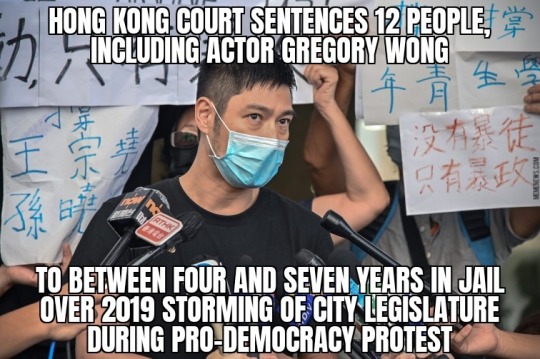
View On WordPress
3 notes
·
View notes
Text
youtube
The cowards at YouTube/Google knuckled under to the PRC’s diktats and blocked access to videos of the pro-democracy anthem “Glory to Hong Kong” in Hong Kong itself. So, please share this with your followers. Because, as a general rule, fuck the CCP.
3 notes
·
View notes
Note
What makes calling the various upheavals around certain parts of the world often collectively called colour revolutions color revolutions, such a sure way to spot someone who has no real knowledge on these events and why specifically russian disinformation? Were they the ones coining the term or is it their preferred line of tactics? I think I heard regular newspeople using it now and I thought it referred to revolutions fostered by the two sides in the cold war and I suppose since too.
The term color revolution specifically applies to revolutions in states like Georgia, Ukraine, and Kyrgyzstan, along with Serbia which was the most pro-Russian of the territories following the breakup of Yugoslavia. They were characterized by anti-authoritarian and pro-democracy sentiment against fraudulent and rigged elections and a push toward anticorruption. So while there were other democratic protests in other regions, "color revolution" specifically refers to these movements. The Hong Kong protests were very similar, but it was not an official color revolution. The term has been more broadly applied to any anti-Russia or anti-China protest, particularly pro-US or pro-European, but that's largely a term of convenience and almost exclusively used by disinformation peddlers and parrots.
Russia was primarily opposed to this because the regional autocrats in charge of these territories tended to be pro-Russian and increasingly looked to integrate their territories with Russia economically and militarily, allowing Russia to maintain a bit of its colonial pull that it enjoyed as the Soviet Union. So they promoted the idea that these revolutions were not organic and were exclusively funded by foreign influence operations largely as a means to preserve their own regional influence and prevent former puppet states from drifting westward. And some foreign influence definitely was the case, many of these regional autocrats saw foreign aid dwindle and be re-routed to NGO's that supported the opposition. But this largely falls to a fallacy that the dictators were owed foreign aid in the first place, and neglects the organic dissatisfaction that a lot of people in those countries felt. These countries suffered under corrupt regimes, with high levels of unemployment, official repression, and poverty. That *always* drive pushes toward opposition. Given the Revolutions of 1989 (which pro-Russians, tankies, and campists also largely describe without evidence as inauthentic), and the later Arab Spring, this appears to be a natural reaction to communications technology making organization easier and information more accessible.
By calling them "CIA-backed," disinformation actors were attempting to link them to CIA-funded, backed, or led coups that were a significant part of US foreign policy and truly did happen, particularly in Central and South America. But these accusations again lack evidence, there aren't any case officers named or operational plans found. It's largely an excuse fabricated out of whole cloth to describe an undesirable outcome, just like any other claim of voting irregularities when someone loses an election.
Thanks for the question, Santa.
SomethingLikeALawyer, Hand of the King
15 notes
·
View notes
Text
Western leaders, the UN and rights groups have joined a chorus of criticism of Hong Kong's new security law, saying it further erodes freedoms.
Article 23, as it's known locally, was unanimously passed by the city's pro-Beijing parliament, targeting a range of offences deemed treasonous.
Officials say the law is essential for stability but opponents called it a "nail in the city's coffin".
China has long pushed for the law and said "smears" by critics would fail.
The new law allows for closed-door trials, gives the police rights to detain suspects for up to 16 days without charge and penalties including life sentences, among other things.
"The new national security legislation is going to double down the repression on freedoms in Hong Kong with extended egregious sentences and a broadened definition of national security," said Frances Hui, an activist now based in the US, who described the legislation as a "final nail in a closed coffin".
A group of 81 lawmakers and public figures from across the world, including in the UK, US, Canada and South Korea, issued a joint statement on Tuesday expressing "grave concerns" over the legislation, which expands on the National Security Law imposed by Beijing in 2020, and criminalises secession, subversion, terrorism and collusion with foreign forces.
"The legislation undermines due process and fair trial rights and violates Hong Kong's obligations under international human rights law, jeopardising Hong Kong's role as an open international city," the statement said, calling it yet another "devastating blow" for freedom.
What is Hong Kong's tough new security law?
Hong Kong's year under China's controversial law
The US said it was "alarmed" by the "sweeping and... vaguely-defined" provisions in the legislation, a concern echoed by the EU, which said the law could affect the city's status as a business centre.
Meanwhile, the UK's Foreign Secretary David Cameron said the law would "further damage rights and freedoms" and "entrench a culture of self-censorship" in the former British colony. Hongkongers have told the BBC how they are already being careful with what they say to friends and colleagues, fearing an "informant culture" has developed in the city.
Lord Cameron's comments sparked a strong response from the Chinese Embassy in the UK, which rubbished his remarks as "a serious distortion of the facts".
China's government also hit back at the criticisms of Article 23, saying it is "unswervingly determined to safeguard national sovereignty, security and development interests, implement the 'one country, two systems' policy, and oppose any external interference in Hong Kong affairs".
"All attacks and smears will never succeed and are doomed to fail," foreign ministry spokesman Lin Jian told a regular press conference in Beijing.
Hong Kong's leader John Lee had earlier also defended the law - which was fast-tracked through its final phase on Tuesday - saying the legislation would help the city "effectively prevent, suppress and punish espionage activities, conspiracies and traps from foreign intelligence agencies, and infiltration and sabotage by hostile forces".
"From now on, the people of Hong Kong will no longer experience these harms and sorrows," he added.
But those who led the pro-democracy protests against China's increasing influence on the city see the new law as yet another lost battle.
It brings Hong Kong "one step closer to the system of mainland China", former Hong Kong lawmaker Nathan Law, who is now in exile in the UK, told the BBC's Newsday programme.
"The chilling effect... and the result of a collapse of civil society is impacting most Hong Kong people."
Ms Hui said she is also concerned the law could also be used to target HongKongers overseas, or their families and friends back home. The city has previously offered bounties for information on activists who fled overseas, and arrested four people in Hong Kong for supporting people abroad who "endanger national security".
Ms Hui left Hong Kong in 2020 after Beijing imposed the NSL that has since seen more than 260 people arrested. It was introduced in response to massive pro-democracy protests which engulfed the city in 2019.
She said civil liberties in Hong Kong are "long gone" four years after the NSL took effect.
Chris Patten, Hong Kong's last British governor, described the legislation as "another large nail in the coffin of human rights and the rule of law in Hong Kong and a further disgraceful breach of the Joint Declaration".
Hong Kong was handed back by the UK to China in 1997 under the principle of "one country, two systems", which guaranteed the city a certain degree of autonomy. While Beijing and Hong Kong both insist this is still the case, critics and international rights groups say China's grip on the city has only tightened with time.
6 notes
·
View notes
Text
The headlines sounded dire: “China Will Use AI to Disrupt Elections in the US, South Korea and India, Microsoft Warns.” Another claimed, “China Is Using AI to Sow Disinformation and Stoke Discord Across Asia and the US.”
They were based on a report published earlier this month by Microsoft’s Threat Analysis Center which outlined how a Chinese disinformation campaign was now utilizing artificial technology to inflame divisions and disrupt elections in the US and around the world. The campaign, which has already targeted Taiwan’s elections, uses AI-generated audio and memes designed to grab user attention and boost engagement.
But what these headlines and Microsoft itself failed to adequately convey is that the Chinese-government-linked disinformation campaign, known as Spamouflage Dragon or Dragonbridge, has so far been virtually ineffective.
“I would describe China's disinformation campaigns as Russia 2014. As in, they're 10 years behind,” says Clint Watts, the general manager of Microsoft’s Threat Analysis Center. “They're trying lots of different things but their sophistication is still very weak.”
Over the past 24 months, the campaign has switched from pushing predominately pro-China content to more aggressively targeting US politics. While these efforts have been large-scale and across dozens of platforms, they have largely failed to have any real world impact. Still, experts warn that it can take just a single post being amplified by an influential account to change all of that.
“Spamouflage is like throwing spaghetti at the wall, and they are throwing a lot of spaghetti,” says Jack Stubbs, chief information officer at Graphika, a social media analysis company that was among the first to identify the Spamouflage campaign. “The volume and scale of this thing is huge. They're putting out multiple videos and cartoons every day, amplified across different platforms at a global scale. The vast majority of it, for the time being, appears to be something that doesn't stick, but that doesn't mean it won't stick in the future.”
Since at least 2017, Spamouflage has been ceaselessly spewing out content designed to disrupt major global events, including topics as diverse as the Hong Kong pro-democracy protests, the US presidential elections, and Israel and Gaza. Part of a wider multibillion-dollar influence campaign by the Chinese government, the campaign has used millions of accounts on dozens of internet platforms ranging from X and YouTube to more fringe platforms like Gab, where the campaign has been trying to push pro-China content. It’s also been among the first to adopt cutting-edge techniques such as AI-generated profile pictures.
Even with all of these investments, experts say the campaign has largely failed due to a number of factors including issues of cultural context, China’s online partition from the outside world via the Great Firewall, a lack of joined-up thinking between state media and the disinformation campaign, and the use of tactics designed for China’s own heavily controlled online environment.
“That's been the story of Spamouflage since 2017: They're massive, they're everywhere, and nobody looks at them except for researchers,” says Elise Thomas, a senior open source analyst at the Institute for Strategic Dialogue who has tracked the Spamouflage campaign for years.
“Most tweets receive either no engagement and very low numbers of views, or are only engaged with by other accounts which appear to be a part of the Spamouflage network,” Thomas wrote in a report for the Institute of Strategic Dialogue about the failed campaign in February.
Over the past five years, the researchers who have been tracking the campaign have watched as it attempted to change tactics, using video, automated voiceovers, and most recently the adoption of AI to create profile images and content designed to inflame existing divisions.
The adoption of AI technologies is also not necessarily an indicator that the campaign is becoming more sophisticated—just more efficient.
“The primary affordance of these Gen AI products is about efficiency and scaling,” says Stubbs. “It allows more of the same thing with fewer resources. It's cheaper and quicker, but we don't see it as a mark of sophistication. These products are actually incredibly easy to access. Anyone can do so with $5 on a credit card.”
The campaign has also taken place on virtually every social media platform, including Facebook, Reddit, TikTok, and YouTube. Over the years, major platforms have purged their systems of hundreds of thousands of accounts linked to the campaign, including last year when Meta took down what it called “the largest known cross-platform covert influence operation in the world.”
The US government has also sought to curb the effort. A year ago, the Department of Justice charged 34 officers of the Chinese Ministry of Public Security’s “912 Special Project Working Group” for their involvement in an influence campaign. While the DOJ did not explicitly link the arrests to Spamouflage, a source with knowledge of the event told WIRED that the campaign was “100 percent” Chinese state-sponsored. The source spoke on the condition of anonymity as they were not authorized to speak publicly about the information.
“A commercial actor would not be doing this,” says Thomas, who also believes the campaign is run by the Chinese government. “They are more innovative. They would have changed tactics, whereas it's not unusual for a government communications campaign to persist for a really long time despite being useless.”
For the past seven years, however, the content pushed by the Spamouflage campaign has lacked nuance and audience-specific content that successful nation-state disinformation campaigns from countries like Russia, Iran, and Turkey have included.
“They get the cultural context confused, which is why you'll see them make mistakes,” says Watts. “They're in the audience talking about things that don't make sense and the audience knows that, so they don't engage with the content. They leave Chinese characters sometimes in their posts.”
Part of this is the result of Chinese citizens being virtually blocked off from the outside world as a result of the Great Firewall, which allows the Chinese government to strictly control what its citizens see and share on the internet. This, experts say, makes it incredibly difficult for those running an influence operation to really grasp how to successfully manipulate audiences outside of China.
“They're having to adapt strategies that they might have used in closed and tightly controlled platforms like WeChat and Weibo, to operating on the open internet,” says Thomas. “So you can flood WeChat and Weibo with content if you want to if you are the Chinese government, whereas you can't really flood the open internet. It's kind of like trying to flood the sea.”
Stubbs agrees. “Their domestic information environment is not one that is real or authentic,” he says. “They are now being tasked with achieving influence and affecting operational strategic impact in a free and authentic information environment, which is just fundamentally a different place.”
Russian influence campaigns have also tended to coordinate across multiple layers of government spokespeople, state-run media, influencers, and bot accounts on social media. They all push the same message at the same time—something the Spamouflage operators don’t do. This was seen recently when the Russian disinformation apparatus was activated to sow division in the US around the Texas border crisis, boosting the extremist-led border convoy and calls for “civil war” on state media, influencer Telegram channels, and social media bots all at the same time.
“I think the biggest problem is [the Chinese campaign] doesn’t synchronize their efforts,” Watts said. “They’re just very linear on whatever their task is, whether it’s overt media or some sort of covert media. They’re doing it and they’re doing it at scale, but it’s not synchronized around their objectives because it’s a very top down effort.”
Some of the content produced by the campaign appeared to have a high number of likes and replies, but closer inspection revealed that those engagements came from other accounts in the Spamouflage network. “It was a network that was very insular, it was only engaging with itself,” says Thomas.
Watts does not believe China’s disinformation campaigns will have a material impact on the US election, but added that the situation “can change nearly instantaneously. If the right account stumbles onto [a post by a Chinese bot account] and gives it a voice, suddenly their volume will grow.”
This, Thomas says, has already happened.
A post, written on X by an account Thomas had been tracking that has since been suspended, referenced “MAGA 2024” in their bio. It shared a video from Russian state-run channel RT that alleged President Joe Biden and the CIA had sent a neo-Nazi to fight in Ukraine—a claim that has been debunked by investigative group Bellingcat. Like most Spamouflage posts, the video received little attention initially, but when it was shared by the account of school shooting conspiracist Alex Jones, who has more than 2.2 million followers on the platform, it quickly racked up hundreds of thousands of views.
“What is different about these MAGAflage accounts is that real people are looking at them, including Alex Jones. It’s the most bizarre tweet I’ve ever seen,” Thomas said.
Thomas says the account that was shared by Jones is different from typical Spamouflage accounts, because it was not spewing out automated content, but seeking to organically engage with other users in a way that made them appear to be a real person—reminiscent of what Russian accounts did in the lead-up to the 2016 election.
So far, Thomas says she has found just four of these accounts, which she has dubbed “MAGAflage,” but worries there may be a lot more operating under the radar that will be incredibly difficult to find without access to X’s backend.
“My concern is that they will start doing this, or potentially are already doing this, at a really significant scale,” Thomas said. “And if that is happening, then I think it will be very difficult to detect, particularly for external researchers. If they start doing it with new accounts that don't have those interesting connections to the Spamouflage network and if you then hypothetically lay on top of that, if they start using large language models to generate text with AI, I think we're in a lot of trouble.”
Stubbs says that Graphika has been tracking Spamouflage accounts that have been attempting to impersonate US voters since before the 2022 midterms, and hasn’t yet witnessed real success. And while he believes reporting on these efforts is important, he’s concerned that these high-profile campaigns could obscure the smaller ones.
"We are going to see increasing amounts of public discussion and reporting on campaigns like Spamouflage and Doppelganger from Russia, precisely because we already know about them,” says Stubbs. “Both those campaigns are examples of activity that is incredibly high scale, but also very easy to detect. [But] I am more concerned and more worried about the things we don't know."
7 notes
·
View notes
Text
A Chinese state-backed institute has found a way to identify who sent any material to another person via Apple’s AirDrop, according to Beijing's government. The institution is said to have cracked the feature to find the email addresses and phone numbers of those who send AirDrop messages as part of an effort to stamp out "undesirable content," as Bloomberg reports.
Police have used the AirDrop crack to identify several suspects. However, Beijing's judicial bureau has not said whether there were any arrests as a result. The approach “improves the efficiency and accuracy of case-solving and prevents the spread of inappropriate remarks as well as potential bad influences,” according to the bureau.
Those with a Mac, iPhone or iPad can use AirDrop to easily send the likes of photos, videos, documents, contacts and passwords to another nearby Apple device. Protesters used AirDrop to share pro-democracy slogans during the demonstrations in Hong Kong in 2019. As MacRumors notes, Apple touts AirDrop as being secure since it employs Transport Layer Security encryption. But the Beijing Municipal Bureau of Justice claims an institute has found a way around the encryption.
2 notes
·
View notes
Text
Today is June 4, the day of mourning for the CIA & capitalism. 1989 was the year when the USSR started to collapse. If only China could be swept under that wave, the globalists’ dream of world domination would come to fruition! Hence the Tiananmen Square protests!
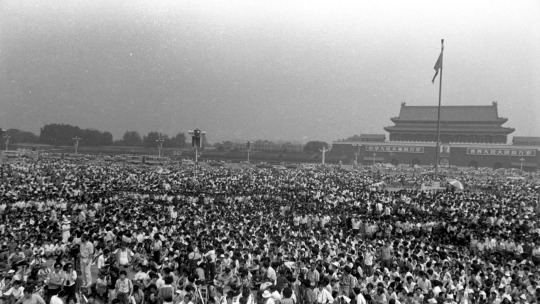
Just like any Color Revolution, all the usual suspects were involved — George Soros, CIA, Western media propaganda, and some pro-US leadership within China. On the ground were mostly innocent students and workers, who had no idea what was happening. They wanted economic and political reforms but not Western-style democracy. They were mostly pro-Mao, pro-socialism, pro-police, pro-military etc. The police were unarmed -- didn't even have batons. Because nobody expected any trouble.


By the way, the gathering wouldn't even have happened. But fate would deal China a bad card. A famous reformer, Hu Yaobang -- Chairman & General Secretary of the CCP -- died on April 15, 1989. He was loved by young Chinese people, who then gathered at the Tiananmen Square to mourn his death. That was the perfect opportunity the USA was waiting for! Thus, on April 20, 1989 – five days after Yaobang’s death – James Lilley was appointed as the US Ambassador to China. He was a 30-year veteran from the CIA. But you can't start a revolution in a week. Since 1986, George Soros had already spent over $1 million cultivating a sizeable number of young radicals. Now, these useful idiots infiltrated the mourning crowd at the Tiananmen Square and transformed it into an American movement.
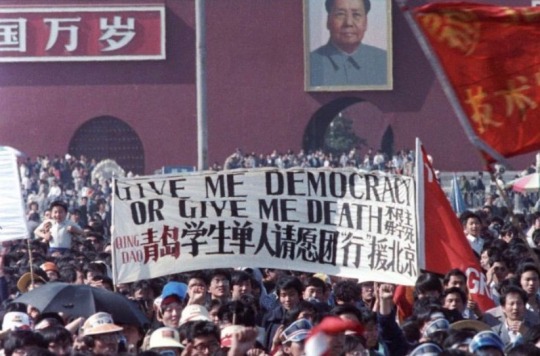
It took the Chinese government one month to realize that shenanigans were happening. For example, BBC and Voice of America (CIA outlet) were broadcasting all kinds of anti-communist propaganda from Taiwan and Hong Kong. So, a martial law was passed on May 20, asking the people to end the gathering. That's when the provocateurs started the violence. They kept escalating.
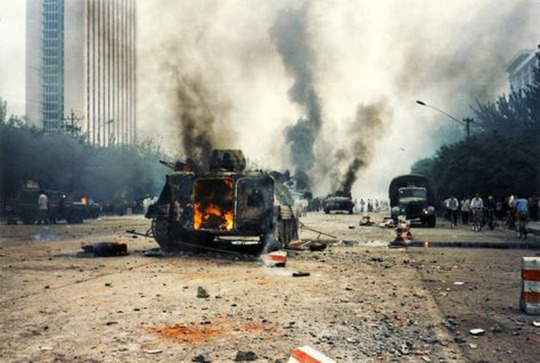

Armed with guns, Molotov cocktails etc., the saboteurs violently attacked and killed 100+ police and soldiers. Chinese police, at the time, had no crowd-control tools like tear gas. They didn't even have guns. Thus, the police got beaten up by the mobs. This is why Beijing had to send in military gear, whose sole purpose was to scare people. The military let the people destroy tanks, armored vehicles etc. If the communist party were so tyrannical, none of this would have happened.
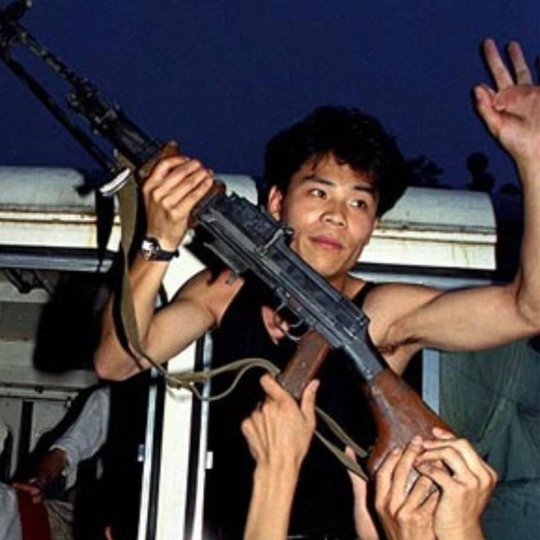
Here is the crux of the matter: There was no "Tiananmen Square massacre"! All the Western Presstitutes who were later forced/bribed to lie had different narratives for a long time: Like, Miles from BBC, Kristof from the NY Times, and Roth from CBS News:

"I was one of the foreign journalists who witnessed the events that night. There was no massacre on Tiananmen Square" — BBC
"State television has even shown film of students marching peacefully away from the [Tiananmen] square shortly after dawn as proof that they [protesters] were not slaughtered” — NY Times
"The military came, negotiated with the students and made everyone (including himself) leave peacefully; and that nobody died in the square" — Reuters
"We saw no bodies, injured people, ambulances or medical personnel — in short, nothing to even suggest, let alone prove, that a “massacre” had occurred in Tiananmen Square" — CBS
And then the globalists who control all the Western media decided to rewrite the story to demonize China.
Did people die on the night of June 3? Yeah, absolutely. There was mayhem in parts of Beijing. Equal number of protesters & law enforcement died that night. Total deaths: 200-300. America's goal was a bloody massacre, which could be exploited for regime change in China. (Tiananmen Square on the morning of June 4)⬇️
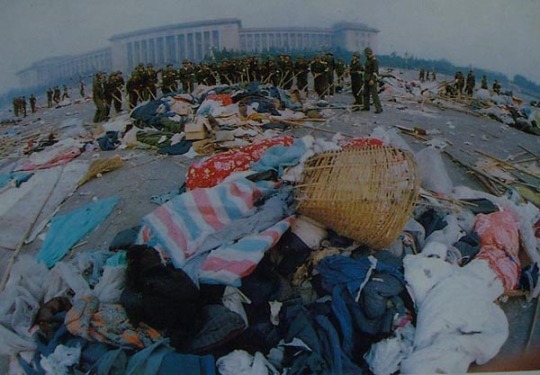
When there was no bloodshed, the US invented a massacre. This is typical American atrocity propaganda. Crazy stories were made up: Like Chinese soldiers on top of buildings mowing down citizens with machine guns; or tanks deliberately crushing people in Tiananmen Square. Psychopaths of the United States of America. And all the young Chinese leaders (stooges) of the protests were able to escape China few days before June 4 and fly to the USA. This clandestine plan was called "Operation Yellowbird." Even the CIA operation had to have a racist overtone.
Like this crazy student leader -- Chai Ling -- who admitted in an interview: “I wanted to tell them [students] that we were expecting bloodshed, that it would take a massacre, which would spill blood like a river through Tiananmen Square, to awaken the people. But how could I tell them this? How could I tell them that their lives would have to be sacrificed in order to win?” She went to Princeton and Harvard... and even got nominated for Nobel prize!! of the American Empire.
But the United States of America is a big fukkking liar. Every Western narrative about China is a lie -- Tiananmen Square massacre, 60 million people killed by Mao's Great leap Forward, Uyghur genocide blah blah.. And there are so many sociopaths at all levels of the US establishment, they can't now figure out what's a woman or a man. The country has turned into the monster that it ascribed to its geopolitical competitors. This is the price you pay for imperialism and colonialism.
The famous "Tank Man" video was cut short by Western propagandists. Why? Because the man leaves unharmed. Doesn't quite fit the narrative of "brutal communist party." Also, it happened on June 4... AFTER the Tiananmen Square was evacuated and peace was restored.
youtube
youtube
Tiananmen Square “massacre” turned out to be a big flat lie.
15 notes
·
View notes
